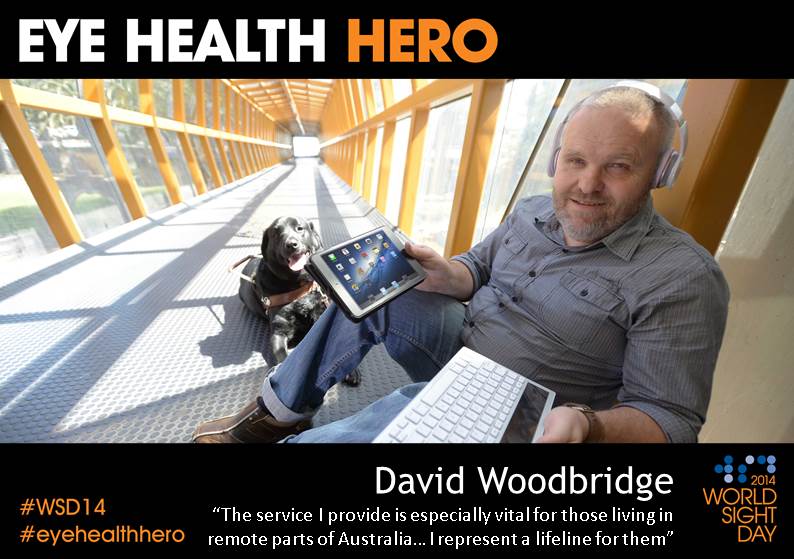David Woodbridge loves his job as an Adaptive Technology Consultant at Vision Australia—so much so that he’s been doing it for 25 years.

In that time, a lot has changed in the technology world, including the advent of the internet, smart phones and tablets.
But David, who has been blind since the age of eight, has always had a knack for how things work. So figuring out the latest voiceover technology on an iPhone is something he doesn’t find hard to do.
“I’m completely self-taught, but I never give up,” David says. “I persist at something until I work out how to do it. I guess I just have an affinity for working things out.”
An average workday for David can range from responding to enquiries that come into the helpdesk, to evaluating new equipment, presenting at conferences, delivering in-house training, and generally being the ‘go to’ person at Vision Australia for any technology issues. David also delivers a Talking Tech radio program for those with vision loss once a week and produces his own podcasts on interesting technology products.
“I love science and technology and I love my job because it’s always varied and new and challenging,” he says. “Because I’m blind myself, I really understand where people are coming from when they are having problems with their phones or iPads. This is because I approach the problem differently to the way a seeing person would.”
David is an Accessibility Ambassador specialising in Apple product enquiries. This means he knows inside out how the accessibility functions, such as voiceover, on Apple gadgets really work.
“People who aren’t blind don’t really get the complexities of the speech function on iPhones and how blind people might need to access and navigate these technologies. I get all the little idiosyncrasies the technology throws up.”
David believes the service he provides at Vision Australia is highly valuable for those living with low vision and blindness.
“I often feel like I’m a part of Choice Magazine—a neutral voice who can advise people on the best products and technologies for them,” he says. “The service I provide is especially vital for those living in remote parts of Australia. For these people, they can’t just go down the street and get help, so I represent a lifeline for them.”
“People who are blind or vision impaired sometimes are not aware of what is out there to increase their quality of life or independence through the use of technology. It is both my personal and professional responsibility to make sure that people have all the options to make an informed choice about what benefits them the most.”
Although born with normal eyesight, David gradually lost his vision in childhood as a result of being exposed to excess oxygen in a humidicrib as a baby. By the time he had reached the age of eight, he was completely blind.
“I still have a visual memory,” David says. “I remember the green grass, the blue sky and the sun shining. I can remember the cape of Superman flying in the wind and the magic windows on Playschool. They’re mostly cartoonish images now, those of a child. What I can’t picture are the things I never saw, like a space station—this is irritating.”
The other thing David misses is not being able to walk into a library or bookstore and just browse the shelves for something to read.
“I love to read and I would love to be able to lose myself in a library or a bookstore for hours on end.”
Having had his sight once, David has learned to take nothing in life for granted. But getting his sight back is not something he really wishes for.
“If I got my sight back now, I wouldn’t be able to do the job I do. So, I don’t really wish for it.
“I love my job and the life I have. Life is for living and I just want to get on with it.”
- Download David’s story in PDF here
- Photo credit: Les O’Rourke
